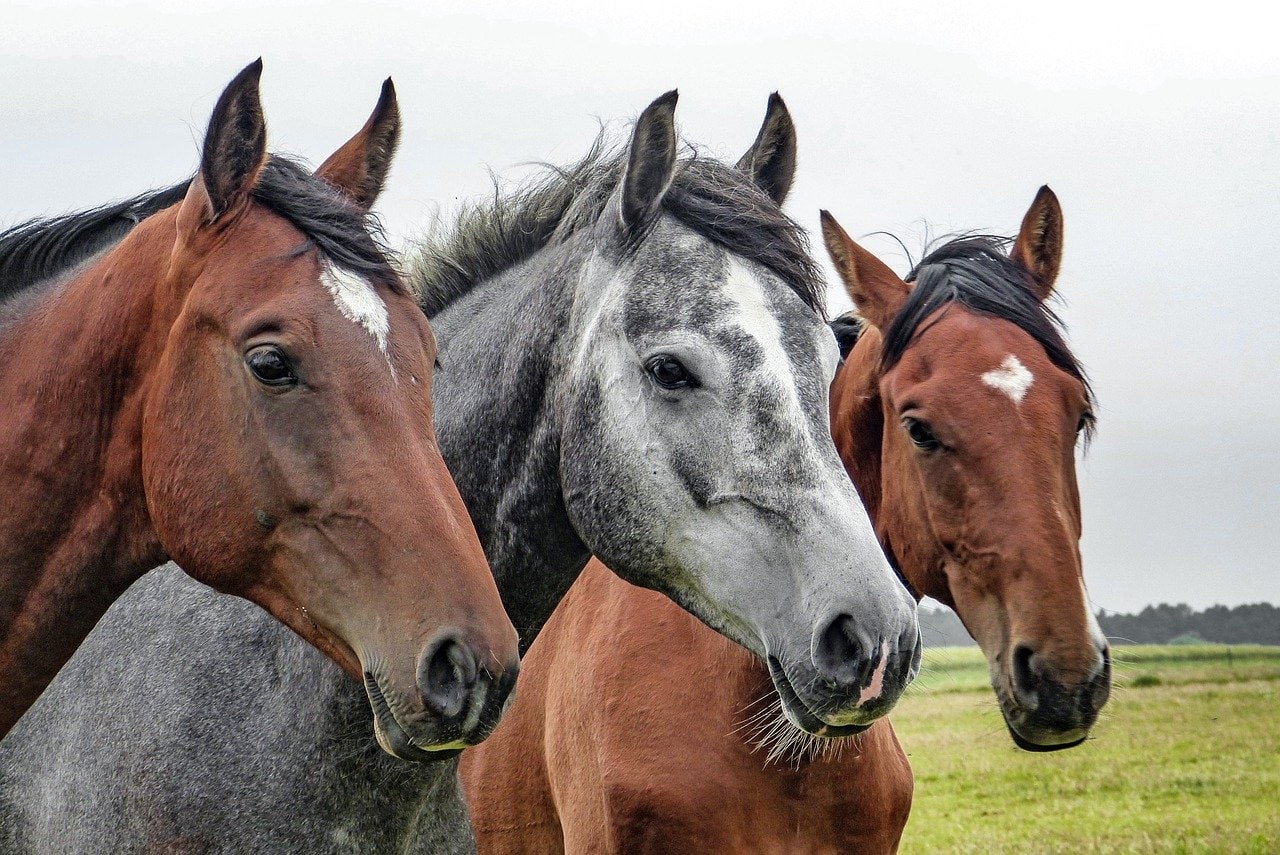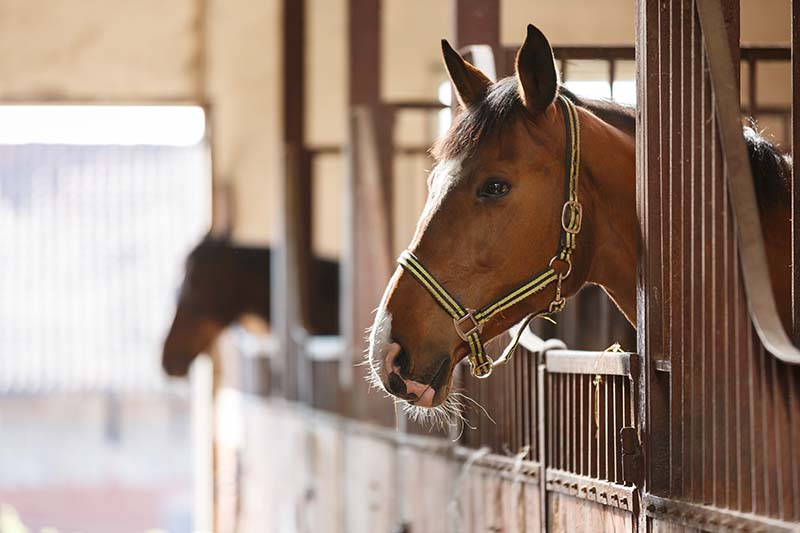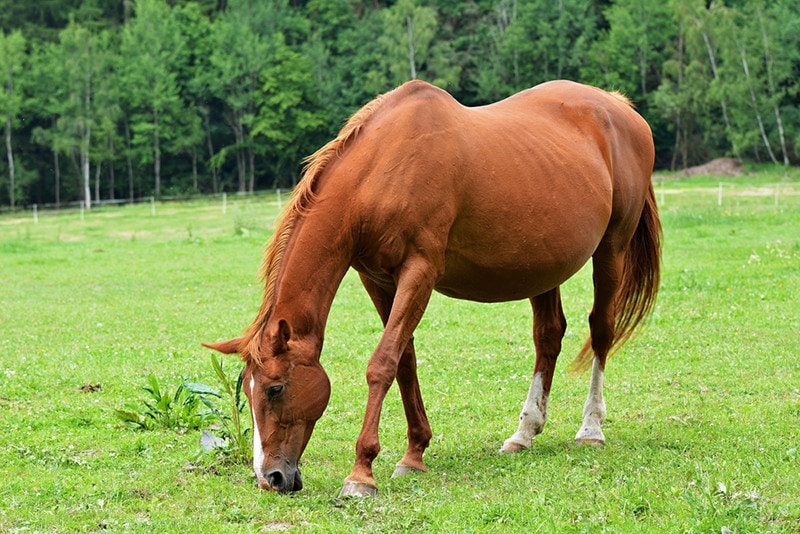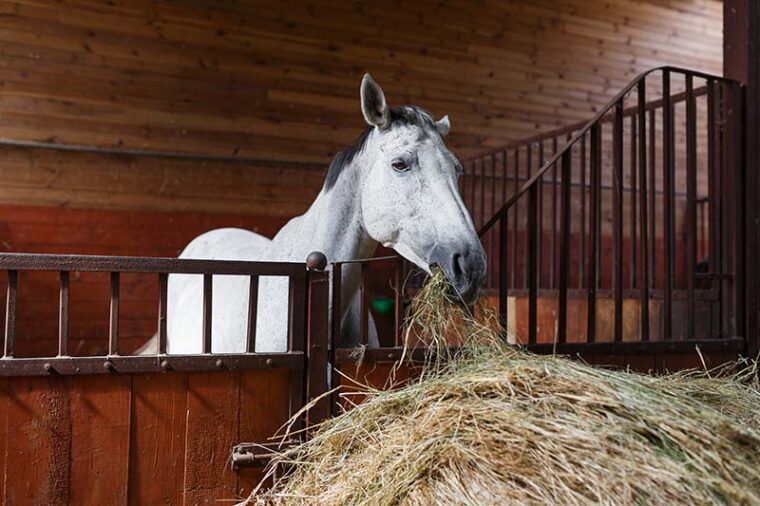
Click to Skip Ahead
Providing your horse with an optimal diet is essential for growth, performance, and overall health. Knowing how much and how often your horse should be fed is equally as important as what you are feeding them.
Horses are grazers, and in their natural environment they will spend around 60% of their day feeding. So ideally, they should be eating small amounts often and throughout the day. Since each horse will have its own unique needs, you’ll need to do some digging and we’re here to help! You should also always seek advice and support from your veterinarian.
Provide Plenty of Regular Forage
In the wild, horses graze across large areas of land feeding primarily on grass, but also edible shrubs, tree foliage, and other plants. Their digestive system is specially designed for this, so the majority of a domesticated horse’s diet should be made up of forage, including pasture and high-quality hay.
Horses that are turned out to graze on good pasture for most of the day will typically not require much hay if any at all. During winter or times of drought, hay should be used to supplement pasture and during periods when the grass is thick and healthy, you can either reduce or eliminate hay if the pasture is large enough.
Any horses that don’t get much pasture turnout or don’t have access to good pasture will require more hay. Free feeding the hay helps replicate their natural dietary rhythm by keeping the forage moving through their digestive system. A diet that includes adequate hay and grass can help prevent colic.
Concentrate can be added if their nutritional needs are not being met with forage, but many companion, pleasure, and trail horses may not require concentrate and can easily feed on pasture and hay. Always talk to your veterinarian regarding questions about your horse’s diet.

Feed Concentrate (As Needed) in Small Amounts Often
Concentrate should only be offered as a supplement to forage. If concentrate is necessary to meet nutrient requirements, it should be fed as several small meals throughout the day. Most horses are provided with concentrate twice a day for the convenience of the caretaker, but it is highly recommended that you split the concentrate into at least 3 but ideally 4 to 6 small meals each day.
These smaller meals are much more suitable for a horse’s digestive system, as their stomachs are relatively small compared to their size, and they naturally consume small amounts of food throughout the day as opposed to large meals in one sitting. Larger meals are very difficult to digest and can contribute to the development of issues such as colic. No horse should be getting more than 0.5 % of their body weight in grain based concentrates during a single feeding.
When feeding concentrate, you should stick to a consistent daily feeding schedule. Whenever you change your horse’s diet in any way, such as the type of feed or rations, you should do so slowly and incrementally over several weeks. If introducing concentrate, start with a minimal amount and adjust as needed under the supervision of your veterinarian, as sudden changes in diet can lead to colic or trigger laminitis (founder).
Understanding Your Horse’s Needs
Each horse is going to have different needs based on their age, size, and activity level. Pregnant and lactating mares will also have different nutritional needs compared to your average adult horse. Take these factors into consideration when figuring out the best diet for your horse. Overfeeding can contribute to the development of serious problems including obesity, laminitis and colic.
We’ve provided feeding charts below that show the recommended daily feed intakes by the percentage of body weight. You will need to pinpoint which category your horse fits into and then use their body weight to determine the amounts of forage and/or concentrate your horse should be getting each day.

Mature Horses
| Mature Horses | Forage | Concentrate | Total |
| Adult Maintenance | 1.5%–2% | 0%–0.5% | 1.5%–2% |
| Mares in Late Gestation | 1%–1.5% | 0.5%–1% | 1.5%–2% |
| Mares in Early Lactation | 1%–2% | 1%–2% | 2%–3% |
| Mares in Late Lactation | 1%–2% | 0.5%–1.5% | 2%–2.5% |
Young Horses
| Young Horses | Forage | Concentrate | Total |
| Nursing, 3 Months | 0% | 1%–2% | 2.5%–3.5% |
| Weanling, 6 Months | 0.5%–1% | 1.5%–3% | 2%–3.5% |
| Yearling, 12 Months | 1%–1.5% | 1%–2% | 2%–3% |
| 18-Month-Old | 1%–1.5% | 1%–1.5% | 2%–2.5% |
| 2-Year-Old | 1%–1.5% | 1%–1.5% | 1.75%–2.5% |

Working Horses
| Working Horses | Forage | Concentrate | Total |
| Light Work | 1%–2% | 0.5%–1% | 1.5%–2.5% |
| Moderate Work | 1%–2% | 0.75%–1.5% | 1.75%–2.5% |
| Intense Work | 0.75%–1.5% | 1%–2% | 2%–3% |
Don’t Forget About Water Intake
Proper hydration is important for a horse’s overall health. Not only does it help maintain proper body condition but promotes healthy digestion and reduces the risk of colic. Horses should have constant access to fresh, clean water at all times. Your average horse will consume approximately 5 to 15 gallons of water each day, if not more. Water consumption can vary depending on temperature, humidity, and the horse’s activity level.
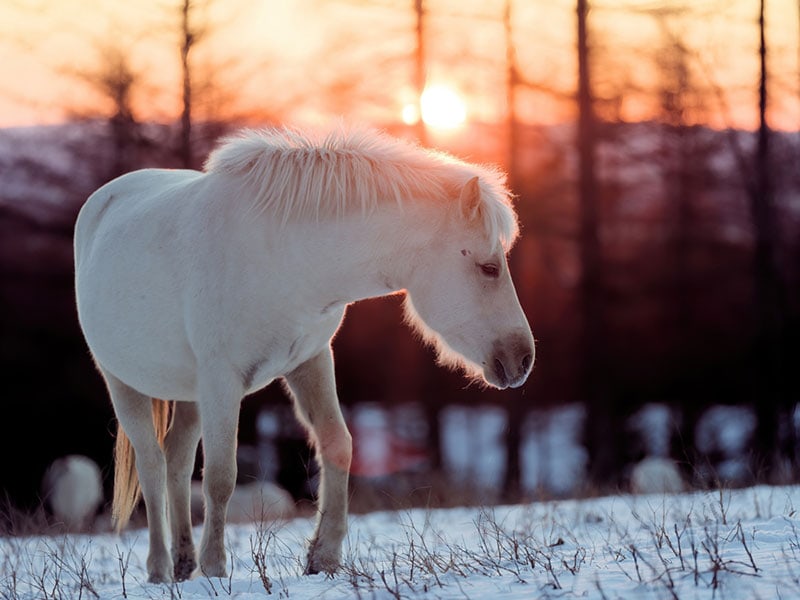
Electrolyte Supplementation
Electrolytes are minerals that are essential for normal body function. The main electrolytes are sodium, potassium, chloride, magnesium and calcium. Horses lose a large amount of electrolytes when they sweat, and it’s up to us to make sure they are getting enough in their diet to prevent an electrolyte imbalance.
Many caretakers will use salt (sodium chloride) or mineral blocks that can be placed in the pasture or in the stall that allows the horse to lick it whenever they please.
Electrolyte supplementation needs will also vary by horse and will be based on the amount and intensity of work they perform. Aside from salt licks, supplementation comes in various forms including powders, pastes, treats, and specialized concentrates.
You should talk to your veterinarian about the best ways to ensure your horse is getting a proper balance of electrolytes within their diet.
Conclusion
How much you feed your horse is dependent on several key factors including age, body weight, activity level, and whether you have a pregnant or lactating mare. Since a horse’s digestive system is naturally designed to take in small amounts of forage throughout the day, it’s best to feed them frequent small meals on a regular schedule. Questions regarding your horse’s diet should always be directed to your veterinarian to ensure they are being provided with an optimal, nutritionally balanced feeding regimen.
Featured Image Credit: Konstantin Tronin, Shutterstock



